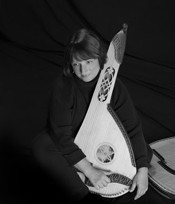Lilia Pavlovsky has a background in investment banking and Ukrainian folk music
If there's such a thing as a typical career path, it wasn't taken by Lilia Pavlovsky.
Pavlovsky, an assistant professor and lecturer at Rutgers’ School of Communication and Information, is a semi-retired folk singer who has worked on Wall Street, harvested potatoes in her grandmother's Ukrainian village and acted off-Broadway.
But her unorthodox career path led Pavlovsky to the top of her field. Last fall, she won the Library Journal Teaching Award after being nominated by students and colleagues.
In classes like “Human Information Behavior,” Pavlovsky explores how and why people seek information and the many different ways it can be used in the digital age.
“There’s more to it than Googling something and getting an answer. It’s about what causes people to look for information … how people respond to and use it, says Pavlovsky, who designs and teaches online classes.
Before Pavlovsky specialized in information science she worked on Wall Street as an administrative assistant. “In those days, most entry-level jobs for women involved a typing test. Being a piano player, I was also a very fast typist so I got a lot of job offers. But I found myself drawn to the energy and salary on Wall Street.’’
Back then, electric typewriters were cutting edge and there was one computer in the office: the Wang machine, an early version of the word processor that only clerical workers knew how to use, recalls Pavlovsky. “Anything with a keyboard was typically associated with women and it was not uncommon to have secretarial or administrative staff promoted to work in the “computer room.” But that was a short-lived as computer science grads, predominantly male at the time, began to enter

Pavlovsky later moved on to investment banking with hopes of becoming a trader but ended up working in the research-driven world of corporate finance at the dawn of the computer era. It was her job to train staffers, who didn’t exactly embrace the new technology. But she managed to put them at ease. “I just loved convincing people that they could learn things they felt were impossible or unimportant to learn,’’ she says. “In a way, teaching is about conveying the value of knowledge.’’
By then, Pavlovsky had given up on her dream of becoming an actress after her drama coach told her that although she had talent, the competitive world of theatre probably wasn’t right for her. “‘Why don't you become a teacher?,’ he said. I was devastated.”
It turned out to be a good suggestion. She earned a master’s degree in library science at Rutgers and began teaching at the university in 1992 as she worked toward her doctoral degree. More than 20 years later, Pavlovsky still loves her job.
“The most important thing is to get students to make a connection between what you know and what they don’t realize they should learn. They have to somehow articulate and understand your message and place it in their own frame of reference,’’ she says.
Although Pavlovsky quit acting to enter academia, she continued her sideline as a Ukrainian folk singer. The daughter of Ukrainian immigrants raised in upstate New York, the songs were part of her everyday life.
"There’s nothing you can do in Ukrainian that doesn’t involve singing,’’ she says. “When Ukrainians came here, they wanted to maintain their traditions and they maintained it through music and songs and dance steps.’’
But some aspects of the music have always mystified her. “At one time, I never understood why the singers sound like they’re yelling,’’ she says. “Then I went to the Ukraine and I had to pick potatoes for dinner. Picking potatoes is not easy. And when I’d look around, I’d see that the fields were huge, and while the women were working they would be singing songs and they would yell over to each other. In a short time, I was totally wiped out while these 60-year-old women were going strong.Those voices emerge from a physical connection to the land. In a place with no plumbing or electricity, the human voice is empowered in ways we cannot understand.’’
Pavlovsky, who knows how to play the bandura, a Ukrainian folk instrument, released a CD of her music in the 1990s and has played in regional clubs.
These days she’s too busy with her two teenage children, who are aspiring ballet dancers, to book coffee house gigs.
But her experience as an actress and musician, she believes, is what makes her good at her job. “The arts help build a well-rounded, creative person. If I didn’t have the background that I had, I wouldn’t be the kind of teacher I am today.’’